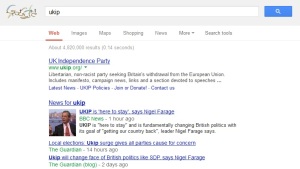
The UK held local council elections this Thursday, with the major talking point to emerge being the relative success of UKIP (United Kingdom Independence Party), who gained 139 local council seats and claimed to have achieved 25% of the popular vote. While that final claim does require a slightly loose definition of the term “popular vote”, it’s still considerably more success than the party has achieved at any point in its 20 year history.
Initial analysis seems to suggest that these gains have come mainly by taking disgruntled voters away from the ruling parties – a not uncommon theme in mid-term style elections. However the direction these disgruntled voters have chosen to go is extremely interesting. In a coalition party that is seen to be Conservative dominated (both in terms of policy and personnel), the space isn’t there for a shift in a more liberal direction as that space has been taken up by the coalition partners. While the Green party does exist as a similarly single-issue-dominated liberal option to UKIP, that may simply seem a step too far – anyone who votes Green is implicitly saying that all 3 main parties are too conservative for them. And if that’s what you think, it must be difficult to get out of bed every morning, let alone vote.
And so UKIP emerge. Already home to a number of ex-Conservative ministers, it seems that they are now the default party for disgruntled Conservative voters – as well as a surprising number of those who are unhappy with the way the Liberal Democrats have handled their first taste of shared power and Labour voters who are upset that their party hasn’t been more of an obstructive force. Based around a strong desire to leave the EU, a dislike of immigration and seemingly not much else, UKIP’s straightforward approach and “getting our country back” (http://www.bbc.co.uk/news/uk-politics-22418387) message seems to have captured the imagination of those who have either disagreed with the policies of those in power, or those who have found themselves unable to engage with the polished and artificial leaders we see so much of.
A number of recent scandals involving ex-BNP members slipping through the vetting system and being allowed to stand as UKIP councillors have caused problems for a party that by it’s very name and nature is easy to see as “the acceptable face of British racism” – although I should point out that the party specifically feels the need to refute this claim in the summary text that comes up when you Google them! However despite the headline issues and claims of racist behaviour that will grab people’s attention, it’s worth taking a look a the other “policies” that fill out the gaps between blanket anti-EU and anti-immigration.
caused problems for a party that by it’s very name and nature is easy to see as “the acceptable face of British racism” – although I should point out that the party specifically feels the need to refute this claim in the summary text that comes up when you Google them! However despite the headline issues and claims of racist behaviour that will grab people’s attention, it’s worth taking a look a the other “policies” that fill out the gaps between blanket anti-EU and anti-immigration.
As a relatively marginal party, it’s has previously been easy for UKIP to campaign on major talking points and ignore the nitty-gritty of some trickier and more intricate subjects. Indeed, Hillary Benn has been quoted as saying that their economics simply do not add up (http://www.guardian.co.uk/politics/2013/may/03/ukip-gains-local-elections) and I harbour serious concerns over the way they view major scientific and social issues, with far too many unflattering comparisons being made between them and the American Republican party on these topics. In this respect, it’s hard not to hope that this turns out to be the peak of UKIP’s powers, as opposed to another step towards legitimacy.
Of course, the success of a single-issue party in local elections will only serve to give that single issue higher prominence. Expect to see significant debate regarding Britain’s place in the EU, a strong UKIP voice next time a major scandal hits the UK’s immigration controls and possibly even a referendum on EU membership. Historical opposition to joining the Euro already shows that there has long been a national hesitation when it comes to jumping in the deep end of a European agreement, and the current instability of that currency is only going to strengthen the resolve of those that resisted initially.
However I worry that this may all be misleading. Did people register a vote for UKIP because they really wanted the government to take a serious look at the issues UKIP believe are important? Or did they simply have a vote in their hands that they didn’t feel could justifiably be given to either the ruling coalition or their seemingly ineffective main opposition? Are we in danger of giving far too much air time and credibility to an issue that doesn’t actually worry that many people? UKIP would say this isn’t the case – I’m not so sure.